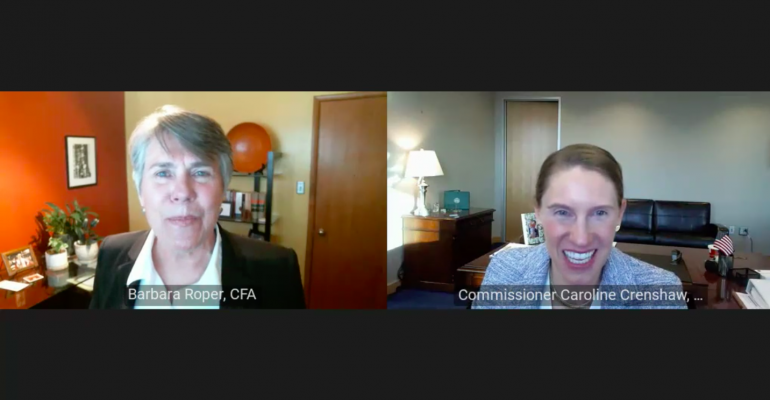The Security and Exchange Commission's Caroline Crenshaw suggested today that under President-elect Joe Biden's administration, and a new SEC chair nominated by the administration, the SEC will likely reexamine its approach to ESG-related disclosures, particularly those around climate risk.
The comments came in the midst of a keynote discussion with Barbara Roper, the Consumer Federation of America’s director of investor protection, during the CFA’s annual Financial Services Conference, which was held virtually this week.
In a wide-ranging discussion, Crenshaw said she shared the concerns of those who questioned whether the voluntary disclosures companies provide around environmental and social impact under the current guidelines are adequate enough to produce reliable and consistent information.
“So given the consensus that climate change will indeed have a significant impact on our financial system, I wouldn’t be surprised to see a renewed focus on our modern disclosure system and what improvements are needed to satisfy investor demands for this reliable and comparable and standardized set of disclosures,” she said.
Crenshaw, who was approved by the Senate to succeed SEC Commissioner Robert Jackson Jr. earlier this year, also said she was sympathetic to criticism of Reg BI. She believed a “strong fiduciary standard of conduct” asserting a client’s interests should come first whether the investor is working with a broker or an investment advisor.
“But we need to have an understanding of the impact Reg BI is having on market practices and outcomes,” she said. “I think we work towards answering those questions by gathering data.”
To Crenshaw, the SEC needed better information on how Reg BI is being implemented to assess its efficacy, and the commission would need to examine whether policies, procedures and behaviors were changing or not. The commission needs to know if representatives are adjusting portfolios and recommendations to comply with the standard, and if they are mitigating conflicts of interest by doing so. They would also question what mitigation procedures firms have in place, and whether or not they are working.
Roper said the CFA would push the commission, under new leadership, to revise Reg BI. While she agreed on the importance of collecting marketplace data early and coordinating data sharing between state and federal regulators, she also believed there were two particular areas where the commission need not wait.
“One would be in defining ‘best interest,’ and the other would be in providing greater clarity around how the Commission interprets the requirement in the rule to mitigate conflicts of interest,” she said. “I would suggest that if we could clarify the meanings of those terms and the Commission can start enforcing to those standards, then you have the capacity to get some real benefits of the rule and may even deliver evidence it’s being implemented in more effective ways.”
Crenshaw also wanted to ensure the commission was testing disclosure documentation more broadly and hoped there would be a renewed focus on how it uses data in its decision-making. While Crenshaw said the commission has focused on making changes to expand investor access to private markets in recent years, she hoped it would soon place more emphasis on ways it could strengthen investor interest and access in public markets.
“I think this issue is extremely important for both our markets and for investors,” she said.




